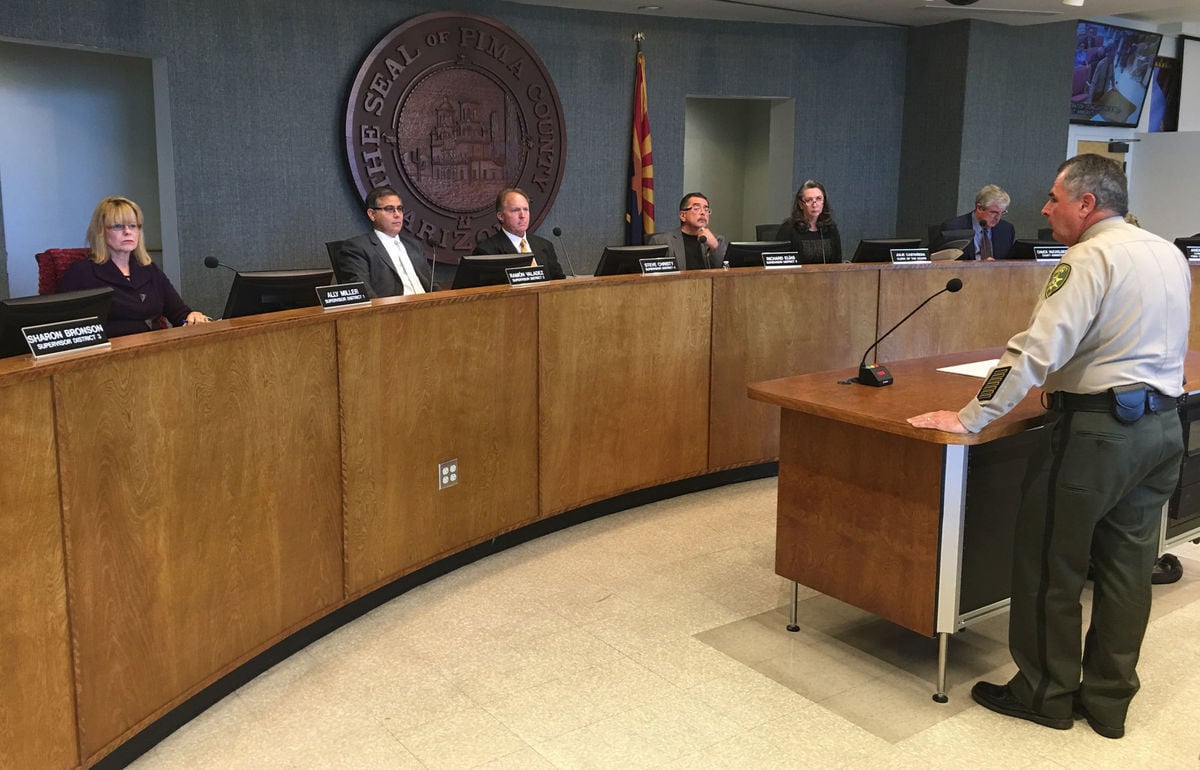The Board of Supervisors tabled consideration of a $360,000 federal grant to the Sheriff’s Department Tuesday until five conditions established for the recent approval of a larger federal grant are met.
That move surprised Sheriff Mark Napier, who told the Star he feels his department has met those conditions.
The High Intensity Drug Trafficking Areas (HIDTA) Program, administered by the Office of National Drug Control Policy, is intended to “facilitate, support and enhance collaborative drug control efforts throughout Arizona,” according to meeting materials. It also supports the County Attorney and Adult Probation offices. Napier said it funds several positions in his department.
HIDTA “provides assistance to federal, state, local, and tribal law enforcement agencies operating in areas determined to be critical drug-trafficking regions of the United States,” according to the Drug Enforcement Administration’s website.
In February, Supervisor Ramón Valadez was part of three-vote a majority that initially rejected a $1.4 million federal Operation Stonegarden grant, which covers overtime costs and other Sheriff’s Department expenses associated with collaboration with federal law enforcement efforts. He later changed his vote, thus greenlighting the grant, but asked Napier’s department to meet five conditions in exchange for his support.
Those included ensuring the grant covers all employee expenses associated with the grant, developing a written policy of how the department’s deputies are to interact with federal law enforcement officers and collecting data to be able to gauge the fiscal impacts of the grant. Valadez also called for setting up a committee tasked with exploring issues of racial profiling.
Once the board feels the Stonegarden conditions are being met, the HIDTA grant “can return” to the board, Valadez told the Star after Tuesday’s meeting.
“We have met all of those conditions,” Napier said after the meeting. “They may not agree with the policy, but we have developed the policy they have asked for.”
He also said that tying approval of the HIDTA grant to compliance with conditions for the Stonegarden grant does not “strike me as good public policy” given that they are “separate and distinct.”
Asked where the Sheriff’s Department was coming up short on the conditions, Valadez said the county administration is reviewing what has been done so far by the sheriff “so we can have a better assessment of whether there has been substantial compliance.”
“Our issue with today was simply when the issue was brought up. I know we didn’t have enough information to actually say, ‘yes, we agree,’ or ‘no, we don’t agree,’” he added.
Reconsideration could come as soon as the board’s next meeting April 3, he said.
Billy Peard, a staff attorney with the American Civil Liberties Union of Arizona’s Tucson office, said he had reviewed an early draft of the Sheriff’s Department policy regarding work with federal officers and found it “wholly inadequate.” An adequate policy, he said, should be specific and not “require every deputy to know every nuance of federal immigration law.”
“I share some of those concerns, but I also know they’re working on getting them to where we need them to be,” Valadez said of the ACLU’s criticism and the Sheriff’s Department’s efforts to develop new policies.
Explaining her vote against tabling consideration of the grant, Supervisor Ally Miller said, “I didn’t agree with imposing those conditions on the Stonegarden grant,” adding it had been approved annually without issue for years.





